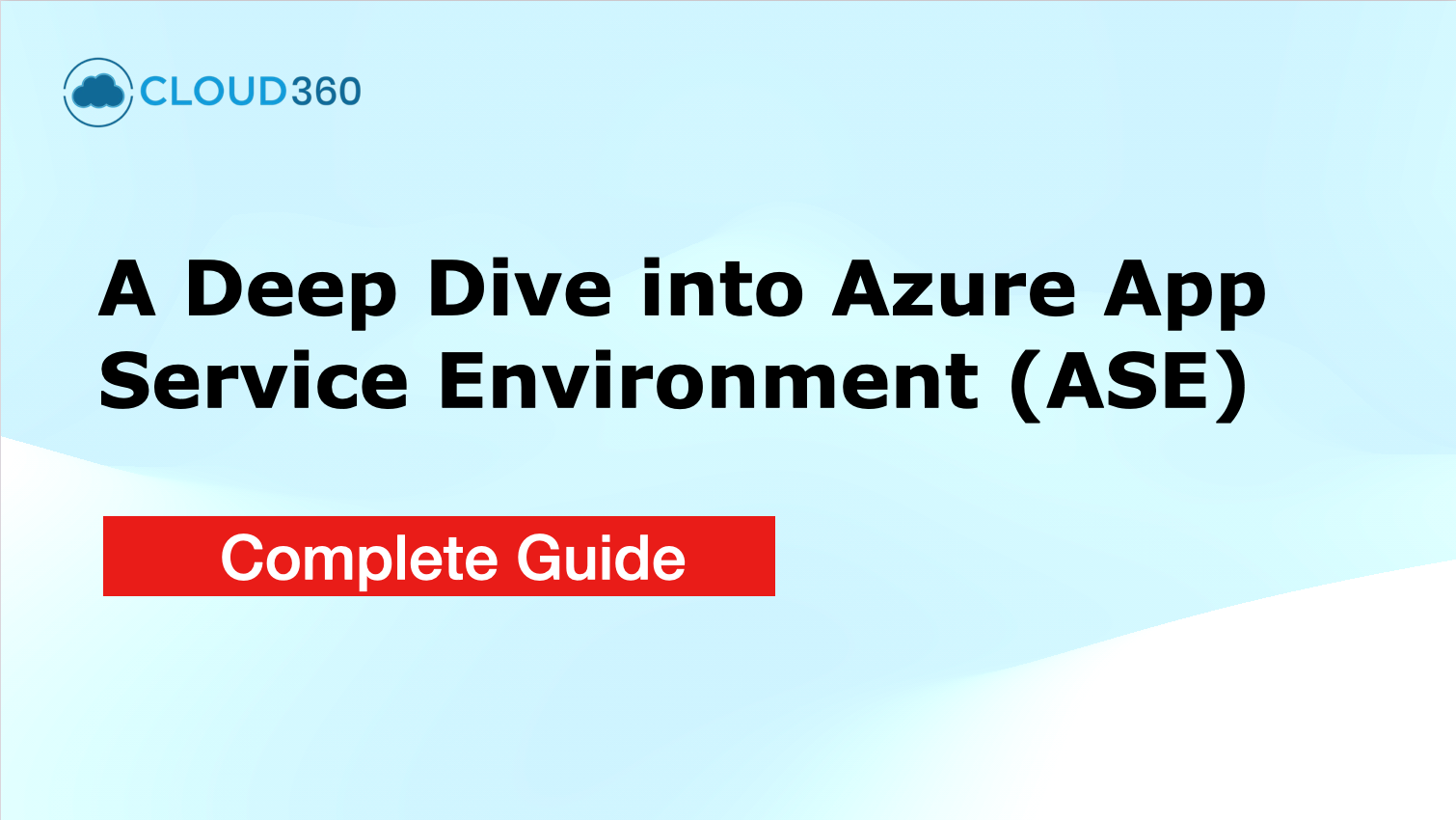Image Credit: Cloud360 Training
In today's cloud-first world, enterprises demand scalable, secure, and high-performance environments for hosting web applications and APIs. While Azure App Service provides a robust platform for quickly deploying and managing applications, organizations with stricter compliance, isolation, or network requirements often need more control over their hosting environment. That’s where Azure App Service Environment (ASE) comes into play.
This article explores what Azure App Service Environment is, its key features, benefits, use cases, and when to consider using ASE for your applications.
What is Azure App Service Environment?
Azure App Service Environment (ASE) is a fully isolated and highly scalable hosting environment for securely running Azure Web Apps, Mobile Apps, and API Apps at a high scale.
Unlike the standard multi-tenant Azure App Service plans, ASE provides a dedicated environment that runs inside your Azure Virtual Network (VNet). This gives you greater control over inbound and outbound traffic, network isolation, and compliance requirements.
Key Characteristics of ASE:
-
Private network isolation: Hosted within a customer’s VNet with full control over IP ranges.
-
High scalability: Can host hundreds of apps with autoscaling capabilities.
-
Enhanced security: Supports private IP addresses, NSGs, and integrates with Azure security tools.
-
Custom domain and SSL support: Offers enterprise-grade hosting with secure endpoints.
Types of Azure App Service Environments
As of now, Microsoft supports the App Service Environment v3, which is a significant improvement over its predecessors (v1 and v2) in terms of deployment simplicity, performance, and cost-effectiveness.
App Service Environment v3 Highlights:
-
Simplified deployment – No need for an Internal Load Balancer or management subnet.
-
Lower cost – No separate stamp fee like previous versions.
-
Faster provisioning – ASE v3 deploys in minutes compared to hours.
-
Zone redundancy support – Offers higher availability.
-
Integration with App Service Plans (Premium v3) – Runs on the same compute resources, allowing you to scale efficiently.
Key Features of Azure App Service Environment
1. Full Network Isolation
ASE runs inside your Azure VNet, giving you complete control over traffic flow using Network Security Groups (NSGs), User-Defined Routes (UDRs), and private endpoints. This is essential for compliance-driven applications that must not be exposed to the public internet.
2. Internal Load Balancing
You can configure ASE with an Internal Load Balancer (ILB), making your apps only accessible within your private network. This is ideal for backend APIs or internal applications that don’t require public exposure.
3. High Scalability
ASE supports thousands of apps per environment. You can scale up and out based on your resource needs, with support for autoscaling and isolated workloads.
4. Custom Domain and SSL Support
You can bind your apps to custom domains and secure them using TLS/SSL certificates, supporting enterprise-grade encryption and compliance.
5. Integrated Monitoring
ASE integrates with Azure Monitor, Application Insights, and Log Analytics, offering full observability into performance, diagnostics, and usage.
6. Dedicated Compute
Apps hosted in ASE run on dedicated compute instances, ensuring consistent performance and resource availability — especially useful for high-throughput applications.
Benefits of Using ASE
✅ Enhanced Security and Compliance
With network isolation, private IPs, and custom access controls, ASE is well-suited for regulated industries like healthcare, finance, and government where data privacy and compliance are critical.
✅ Custom Network Configuration
You get full control over the VNet, subnets, IP ranges, and integration with on-premises networks via VPN or ExpressRoute.
✅ High Performance and Availability
ASE uses isolated compute and supports availability zones, ensuring high performance and fault tolerance.
✅ Multi-App Hosting
You can host multiple applications within a single ASE instance, optimizing cost and management while maintaining isolation and scalability.
✅ Private Integration with Other Azure Services
Integrate seamlessly with services like Azure SQL Database, Azure Storage, and Key Vault using private endpoints — all within your VNet.
Common Use Cases for ASE
-
Hosting internal line-of-business (LOB) applications that should not be exposed to the internet.
-
Deploying secure APIs for internal microservices communication within enterprise networks.
-
Running regulated workloads that require strict compliance (e.g., HIPAA, FedRAMP, GDPR).
-
Hybrid cloud scenarios where apps need to securely interact with on-premises infrastructure.
-
Large-scale multi-tenant SaaS applications needing app isolation and resource control.
ASE vs. Standard Azure App Service: Key Differences
| Feature |
Standard App Service |
App Service Environment (ASE) |
| Hosting |
Multi-tenant |
Dedicated, isolated |
| Network control |
Limited |
Full VNet integration |
| Private IP support |
No |
Yes |
| ILB support |
No |
Yes |
| Scale |
Limited to app plan |
Scales across environment |
| Cost |
Lower |
Higher (for enterprise workloads) |
| Security |
Shared network |
Fully isolated network |
| Compliance |
General use |
Suitable for regulated industries |
Things to Consider Before Using ASE
-
Cost: ASE is designed for enterprise-grade workloads and may be overkill (and expensive) for small to medium applications.
-
Complexity: Requires deeper understanding of networking, subnets, and Azure VNet configurations.
-
Deployment Time: Though ASE v3 improved provisioning times, the environment setup is still more involved than standard App Services.
-
Resource Limits: Like any Azure service, ASE has quotas and limits — ensure you plan capacity accordingly.
Conclusion
Azure App Service Environment offers a powerful, secure, and scalable hosting solution for mission-critical and compliance-sensitive web applications. By combining the flexibility of PaaS with the isolation of IaaS, ASE provides a unique bridge for enterprises looking to modernize their apps while maintaining full control over network and security boundaries.
If you're building applications that demand high performance, isolation, and enterprise-grade networking — ASE v3 is the ideal platform to consider.
Need help designing or deploying your solution with Azure App Service Environment? Contact the Cloud360 team today for expert training and consulting services!


